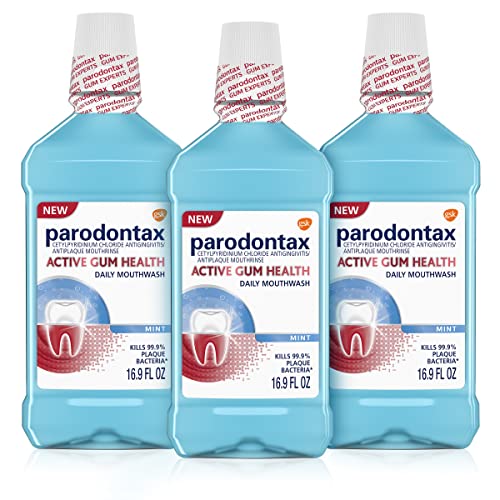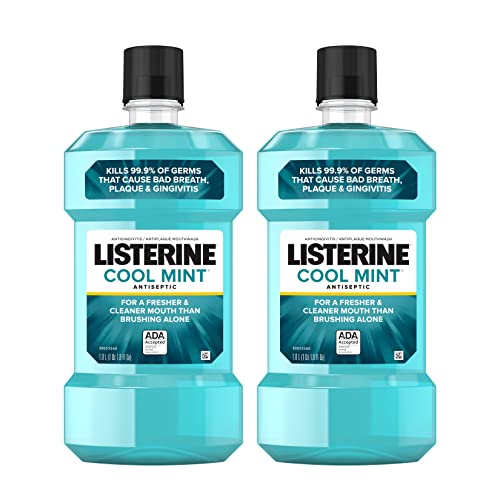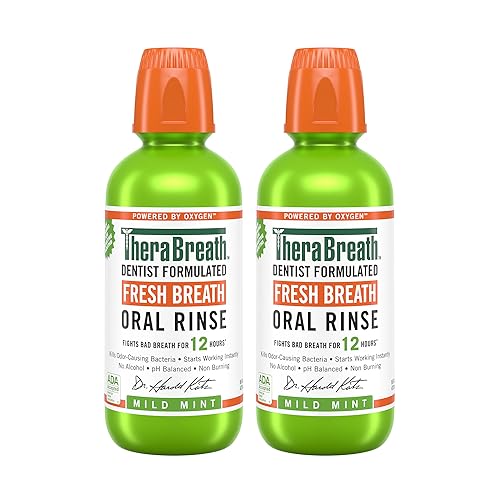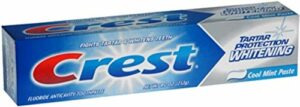We understand that maintaining good oral hygiene can be a challenge, especially when faced with the overwhelming number of mouthwash options available in the market. It’s frustrating to stand in front of the aisle, trying to decipher the long list of ingredients and their purpose. That’s why we’re here to help. In this blog post, we aim to demystify the common ingredients found in antimicrobial mouthwash and explain how they contribute to your oral health. By shedding light on these ingredients, we hope to empower you with the knowledge needed to make informed decisions about the mouthwash that’s best for you. So let’s dive in and unravel the secrets behind antimicrobial mouthwash ingredients together!
Combat Oral Bacteria with Top-Selling Antimicrobial Mouthwash
Common Antimicrobial Ingredients
Maintaining good oral hygiene is essential for overall health, and using mouthwash as part of your daily routine can help to combat bacteria and keep your mouth fresh and clean. Antimicrobial mouthwashes are specifically designed to kill or inhibit the growth of microorganisms in the mouth, preventing dental diseases such as plaque, gingivitis, and bad breath. In this blog post, we will explore the most common antimicrobial ingredients found in mouthwash and their benefits.
Chlorhexidine
Key points:
- Widely regarded as the gold standard in antimicrobial mouthwash.
- Highly effective against bacteria, fungi, and viruses.
- Provides long-lasting protection.
Chlorhexidine is a powerful antimicrobial agent commonly used in mouthwashes due to its broad spectrum of activity. It is particularly effective against bacteria, fungi, and viruses, making it an excellent choice for individuals with oral health concerns. Chlorhexidine works by destroying the cell walls of microorganisms, preventing their growth and reproduction.
Despite its effectiveness, chlorhexidine does have some drawbacks. Prolonged use can cause tooth staining and alter taste perception. However, these side effects are generally reversible and can be managed by following proper usage instructions.
Cetylpyridinium Chloride
Key points:
- Effective against bacteria and fungi.
- Offers a milder taste compared to chlorhexidine.
- Provides fresh breath and lasting protection.
Cetylpyridinium chloride (CPC) is another common antimicrobial ingredient found in mouthwashes. It is primarily active against bacteria and fungi, making it an excellent choice for preventing oral infections. CPC has a milder taste compared to chlorhexidine, making it more palatable for individuals who may find the taste of other mouthwashes unpleasant.
In addition to its antimicrobial properties, CPC also helps to freshen breath by reducing the production of volatile sulfur compounds (VSCs), which are responsible for causing bad breath. This dual action makes CPC an attractive option for those looking to maintain oral health and combat halitosis.
Essential Oils
Key points:
- Natural antimicrobial agents derived from plants.
- Effective against bacteria and fungi.
- Offer a refreshing taste and aroma.
Essential oils extracted from plants, such as tea tree oil, eucalyptus oil, and peppermint oil, have been used for centuries for their medicinal properties. In mouthwashes, these oils serve as natural antimicrobial agents, effectively targeting bacteria and fungi.
Apart from their antimicrobial benefits, essential oils also provide a refreshing taste and aroma, leaving the mouth feeling clean and revitalized. The natural origin of these oils appeals to individuals seeking more environmentally friendly oral care products.
Choosing the Right Mouthwash
When selecting an antimicrobial mouthwash, it is essential to consider your specific oral health needs and preferences. Here are some key points to consider:
- Effectiveness: Look for mouthwashes that have been proven to be effective against oral bacteria and provide long-lasting protection.
- Taste: Consider the taste of the mouthwash, as this can play a significant role in compliance with regular use.
- Side effects: Be aware of any potential side effects associated with the ingredients used in the mouthwash and follow usage instructions carefully.
- Natural alternatives: If you prefer a more natural approach, explore mouthwashes that contain essential oils as antimicrobial agents.
By carefully considering these factors, you can choose an antimicrobial mouthwash that suits your needs and helps you maintain optimal oral health.
In conclusion, antimicrobial mouthwashes containing chlorhexidine, cetylpyridinium chloride, or essential oils offer effective solutions for combating oral bacteria, preventing dental diseases, and promoting fresh breath. Understanding the benefits and considerations of these common antimicrobial ingredients can help you make an informed decision when selecting a mouthwash that best suits your needs. Remember to consult with your dentist or dental professional for personalized recommendations and guidance.
Benefits of Antimicrobial Mouthwash
Maintaining good oral hygiene is essential for a healthy mouth and a bright smile. Brushing your teeth twice a day and flossing regularly are important steps, but sometimes they may not be enough. This is where antimicrobial mouthwash comes in. Antimicrobial mouthwash, often referred to as antibacterial mouthwash, is a powerful tool that can complement your oral hygiene routine and provide numerous benefits. In this blog section, we will explore the benefits of using antimicrobial mouthwash and why it should be a part of your oral care routine.
Reducing Plaque Buildup
Plaque is a sticky film that forms on the surface of teeth and along the gumline. It is made up of bacteria and food particles and can lead to tooth decay and gum disease if not properly managed. Antimicrobial mouthwash contains active ingredients, such as chlorhexidine or essential oils, that help reduce the amount of plaque on your teeth. By rinsing with an antimicrobial mouthwash, you can effectively combat the growth of bacteria, preventing plaque buildup and keeping your teeth clean and healthy.
Benefits:
- Reduces plaque formation
- Helps prevent tooth decay and cavities
- Promotes overall oral health
Fighting Bad Breath
Bad breath, also known as halitosis, can be an embarrassing problem that affects your self-confidence and social interactions. While there are various causes of bad breath, one common culprit is the buildup of bacteria in the mouth. Antimicrobial mouthwash targets these bacteria, helping to eliminate the source of bad breath rather than simply masking it. By incorporating antimicrobial mouthwash into your routine, you can enjoy fresher breath throughout the day.
Benefits:
- Eliminates bacteria that cause bad breath
- Provides long-lasting fresh breath
- Boosts self-confidence
Preventing Gum Disease
Gum disease, also known as periodontal disease, is a serious condition that affects the tissues surrounding and supporting the teeth. It can lead to gum inflammation, gum recession, tooth loss, and even impact your overall health. Antimicrobial mouthwash can play a crucial role in preventing the onset and progression of gum disease. By targeting and killing harmful bacteria, it helps keep your gums healthy and reduces the risk of infection and inflammation.
Benefits:
- Helps prevent gum disease
- Reduces gum inflammation and bleeding
- Protects gum tissue from damage
Other Benefits to Consider
Apart from the main benefits mentioned above, antimicrobial mouthwash offers additional advantages that are worth considering:
- Convenience: Antimicrobial mouthwash is a convenient adjunct to brushing and flossing, providing an extra layer of protection against oral health issues.
- Ease of Use: Using antimicrobial mouthwash is as simple as rinsing your mouth for the recommended duration, usually around 30 seconds to one minute.
- Improved Overall Oral Health: By reducing plaque, fighting bad breath, and preventing gum disease, antimicrobial mouthwash contributes to improving your overall oral health, resulting in a healthier smile.
In conclusion, antimicrobial mouthwash offers numerous benefits that can enhance your oral hygiene routine. By reducing plaque, fighting bad breath, and preventing gum disease, it plays a vital role in maintaining a healthy mouth. Consider adding antimicrobial mouthwash to your daily oral care routine to enjoy these benefits and ensure a bright smile for years to come.
Considerations and Potential Side Effects
When it comes to maintaining good oral hygiene, many people turn to the use of antimicrobial mouthwash. While these products can be effective in reducing the bacteria that cause bad breath and gum disease, it is important to be aware of the potential side effects that may arise. In this section, we will discuss some of the considerations and possible side effects of using antimicrobial mouthwash.
Staining of Teeth and Tongue
One of the potential side effects of using antimicrobial mouthwash is the staining of teeth and tongue. Some mouthwashes contain ingredients such as chlorhexidine or cetylpyridinium chloride that can lead to discoloration over time. This staining is usually temporary and can be minimized through proper oral care practices, such as regular brushing and flossing. However, if you notice any persistent staining, it is advisable to consult your dentist.
Altered Taste Perception
Another side effect that some individuals may experience when using antimicrobial mouthwash is altered taste perception. This can range from a temporary metallic taste to a more prolonged alteration in the sense of taste. While this side effect is generally not harmful, it can be bothersome for some individuals. If you find that your taste perception has been affected, consider trying a different brand or formulation of mouthwash.
Allergic Reactions
In rare cases, individuals may develop allergic reactions to the ingredients found in antimicrobial mouthwash. Symptoms of an allergic reaction can include itching, swelling, rash, or difficulty breathing. If you experience any of these symptoms after using mouthwash, discontinue use immediately and seek medical attention.
Considerations for Specific Individuals
While antimicrobial mouthwash can be beneficial for many individuals, there are certain considerations to keep in mind for specific groups:
Pregnant Women
Pregnant women should exercise caution when using antimicrobial mouthwash. Some studies have suggested a potential link between certain mouthwash ingredients and adverse pregnancy outcomes. It is always a good idea to consult with your healthcare provider before using any oral care products during pregnancy.
Individuals with Certain Medical Conditions
If you have certain medical conditions, such as diabetes or compromised immune function, it is important to discuss the use of antimicrobial mouthwash with your healthcare provider. They can provide guidance on the best approach for your specific situation.
Key Points to Remember
To summarize the potential side effects and considerations when using antimicrobial mouthwash:
- Staining of teeth and tongue can occur but is usually temporary and can be minimized through proper oral care.
- Altered taste perception may occur, but trying different brands or formulations may help mitigate this side effect.
- Allergic reactions are rare but should be taken seriously. Seek medical attention if you experience symptoms.
- Pregnant women should consult with their healthcare provider before using antimicrobial mouthwash.
- Individuals with certain medical conditions should discuss the use of mouthwash with their healthcare provider.
Remember, maintaining good oral hygiene is essential for overall health. If you have any concerns or questions about using antimicrobial mouthwash, don’t hesitate to reach out to your dentist or healthcare provider for guidance.
Choosing the Right Antimicrobial Mouthwash
Taking care of our oral health is essential for maintaining overall well-being. Alongside brushing and flossing, using an antimicrobial mouthwash can provide an extra layer of protection against harmful bacteria and promote a healthier mouth. However, with so many options available on the market, it can be overwhelming to choose the right one.
In this blog post, we will provide you with some helpful tips to choose the most suitable antimicrobial mouthwash based on your personal preferences and oral health needs. We will discuss factors to consider, such as alcohol content, flavor, and specific oral health concerns.
Alcohol Content
One of the first things to consider when choosing an antimicrobial mouthwash is the alcohol content. While alcohol-based mouthwashes are effective at killing bacteria, they can be harsh on the mouth and cause dryness or irritation for some individuals. Here are some key points to keep in mind regarding alcohol content:
- Alcohol-based mouthwashes typically contain around 20-30% alcohol.
- Non-alcoholic mouthwashes are a suitable alternative for those who experience sensitivity or dryness.
- Alcohol-free mouthwashes often contain other antimicrobial agents that can effectively kill bacteria.
Flavor
Choosing a mouthwash with a flavor you enjoy can make your oral hygiene routine more pleasant and encourage consistent use. Here are some popular flavors to consider:
- Mint: Mint-flavored mouthwashes provide a refreshing and cooling sensation.
- Citrus: Citrus-flavored mouthwashes offer a tangy and invigorating taste.
- Berry: Berry-flavored mouthwashes provide a sweet and fruity flavor.
Specific Oral Health Concerns
Different individuals may have specific oral health concerns that can be addressed by choosing an antimicrobial mouthwash tailored to their needs. Here are some common concerns and corresponding mouthwash features to consider:
- Gum Health: Look for a mouthwash that contains ingredients like chlorhexidine or essential oils (such as tea tree oil or eucalyptus) known for their ability to promote gum health.
- Bad Breath: Mouthwashes that contain ingredients like cetylpyridinium chloride (CPC) or zinc can effectively combat bad breath.
- Sensitive Teeth: Opt for a mouthwash formulated for sensitive teeth, which often includes ingredients like potassium nitrate to help alleviate sensitivity.
Comparison Table
To help you make a more informed decision, here’s a comparison table summarizing the key points discussed:
| Factor | Alcohol Content | Flavor | Oral Health Concerns |
|---|---|---|---|
| Mouthwash A | Alcohol-based | Mint | Gum Health |
| Mouthwash B | Non-alcoholic | Citrus | Bad Breath |
| Mouthwash C | Alcohol-free | Berry | Sensitive Teeth |
Choosing the right antimicrobial mouthwash is a personal decision based on your preferences and oral health needs. By considering factors such as alcohol content, flavor, and specific concerns, you can find a mouthwash that suits you best and helps you achieve a healthier mouth. Remember to consult with your dentist or oral healthcare professional for personalized recommendations.
Happy mouthwash shopping!
Understanding the importance of choosing the right antimicrobial mouthwash for your oral health needs
In conclusion, understanding the common ingredients in antimicrobial mouthwash can help us make informed choices for our oral health. We have learned about key components such as chlorhexidine, cetylpyridinium chloride, and essential oils, each with their own benefits and considerations. However, it is crucial to remember that everyone’s oral health needs are unique. Therefore, we strongly recommend consulting with a dentist or healthcare professional to determine the most suitable antimicrobial mouthwash for our individual needs. Their expertise will ensure that we are using a mouthwash that effectively targets our specific oral concerns, promoting optimal oral hygiene and overall well-being.






















